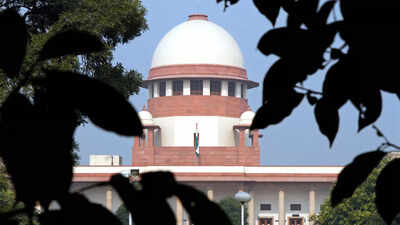Top Searches
- News
- India News
- Non-reporting of Pocso offences a serious crime: Supreme Court
Non-reporting of Pocso offences a serious crime: Supreme Court

Supreme Court said non-reporting of sexual assault of minors to police is a serious crime
NEW DELHI: The Supreme Court on Wednesday said non-reporting of sexual assault of minors to police is a serious crime under the Protection of Children from Sexual Offences (Pocso) Act and ordered a doctor to face trial for not reporting sexual exploitation of several minor tribal girls in a Maharashtra students hostel.
During medical examination, the minor tribal students, some of them in class three and five, had informed the doctor about their sexual exploitation by the superintendent of the hostel of Infant Jesus English Public High School in Chandrapur district and four others. But the medical practitioner allegedly kept silent to protect the accused.
The police in June 2019 had chargesheeted the five accused as also the doctor under Pocso. Earlier this year, the Nagpur bench of the Bombay HC quashed the chargesheet against the doctor after undertaking a through and elaborate scrutiny of the statements of the survivors. The state government had appealed against the high court judgment in the SC.
Allowing the appeal, a bench of Justices Ajay Rastogi and C T Ravikumar said, “Prompt and proper reporting of the commission of offence under the Pocso Act is of utmost importance and we have no hesitation to state that failure to do so, even after coming to know about the commission of any offence thereunder, would defeat the very purpose and object of the Act.”
Writing the judgment reversing the HC decision, Justice Ravikumar said, “Non-reporting of sexual assault against a minor child despite knowledge is a serious crime and more often than not, it is an attempt to shield offenders of the crime of sexual assault.”
The bench said, “We may say, we are not peeved, but certainly pained, as a legitimate prosecution under the Pocso Act has been throttled at the threshold by the exercise of power under Section 482 of the CrPC without permitting the materials in support to it to see the light of the day in respect of misprision of sexual assault against minor tribal girls in a girls’ hostel.”
The high court should have permitted the prosecution to adduce evidence and its scrutiny during the trial instead of launching into an elaborate inquiry all by itself, the apex court said.
During medical examination, the minor tribal students, some of them in class three and five, had informed the doctor about their sexual exploitation by the superintendent of the hostel of Infant Jesus English Public High School in Chandrapur district and four others. But the medical practitioner allegedly kept silent to protect the accused.
The police in June 2019 had chargesheeted the five accused as also the doctor under Pocso. Earlier this year, the Nagpur bench of the Bombay HC quashed the chargesheet against the doctor after undertaking a through and elaborate scrutiny of the statements of the survivors. The state government had appealed against the high court judgment in the SC.
Allowing the appeal, a bench of Justices Ajay Rastogi and C T Ravikumar said, “Prompt and proper reporting of the commission of offence under the Pocso Act is of utmost importance and we have no hesitation to state that failure to do so, even after coming to know about the commission of any offence thereunder, would defeat the very purpose and object of the Act.”
Writing the judgment reversing the HC decision, Justice Ravikumar said, “Non-reporting of sexual assault against a minor child despite knowledge is a serious crime and more often than not, it is an attempt to shield offenders of the crime of sexual assault.”
The bench said, “We may say, we are not peeved, but certainly pained, as a legitimate prosecution under the Pocso Act has been throttled at the threshold by the exercise of power under Section 482 of the CrPC without permitting the materials in support to it to see the light of the day in respect of misprision of sexual assault against minor tribal girls in a girls’ hostel.”
The high court should have permitted the prosecution to adduce evidence and its scrutiny during the trial instead of launching into an elaborate inquiry all by itself, the apex court said.
FOLLOW US ON SOCIAL MEDIA
FacebookTwitterInstagramKOO APPYOUTUBE
Start a Conversation
end of article









